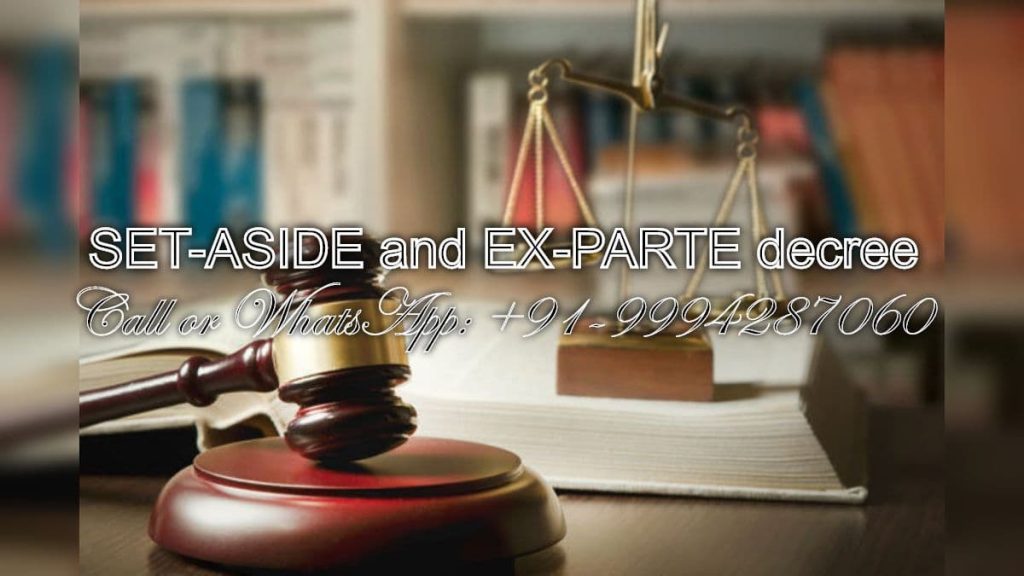Find the Best Civil Lawyers in Chennai, Tamil Nadu, India. Rajendra Civil Law Firm is one of the Top Civil Advocates offices in India. Learn more about Set-Aside and Ex-Parte Decree [Orders]. Get the Best Legal Consultation to know more about Civil laws and proceedings.
Best Advocates for SET-ASIDE and EX-PARTE
In this paragraph, Introduction: To cancel or refute a court order or judgment by another court order.
Illustration: a court excuses a complaint accepting the case had been settled. After being said by an attorney’s actions that the claim was not settled. The appointed authority will give an order to “set aside” the first dismissal.

What is an Ex-parte decree?
An ‘Ex-parte decree’ is a decree gone against a litigant in absentia. Despite the administration of summons. On the date of the hearing, the plaintiff does and a respondent doesn’t show up. The Court may hear the suit ex-parte and pass a decree against the litigant. The lawful legitimacy and the enforceability of such a decree are like any bi-party decree.
Decree When E- Parte:
Ascertaining the idea of the decree whether it is an ex-parte decree is a blended inquiry of law and certainty. Records of the Court and conditions under which the decree was passed show the absence of the specific respondent. The decree must be taken as ex-parte. A decree dependent on a compromise can’t be treated as an ex-parte decree. Thus Rule 13 Order IX doesn’t have any significant bearing.
Setting aside Decrees ex parte
Rule 13 – Setting aside decree ex-parte against the respondent
however, If a decree is passed ex-parte against a respondent, he may apply to the Court by which the decree was passed for an order to save it. And if he fulfils the Court that the summons was not properly served. Or that he was forestalled by any adequate reason when the suit was approached for hearing. The Court will make an order setting aside the decree against him. Upon such terms as to costs, instalment into Court, or in any case as it might suspect fit. And will select a day for continuing with the suit:
Given that where the decree is of such a nature, that it can’t be put aside. As against such respondent just it might be put aside as against all or any of different litigants too. Also, that no Court will put aside a decree passed ex-parte only on the ground that there has been an anomaly in the administration of summons. If it is fulfilled that the respondent had notice and had adequate opportunity to show up.
Rule 14 – No decree to be put aside without notice to the opposite party.
The court will not set aside any decree on such an application unless the court has served notice on the opposing party.
Remedies Against Ex-Parte Decree

1. An Application Under Order 9, Rule 13,
Order 9 Rule 13 expresses
The litigant may apply to the court that passed the ex-parte decree to save it. If the court is satisfied that the summons was not properly served or the litigant was prevented from appearing, the court may set aside the decree and schedule a continuation. The court cannot set aside the decree against a respondent if it is of such a nature. However, the court may set aside the decree against some or all other respondents.
2. Appeal Under Section 96
One may appeal a unique decree passed ex-parte. Unless explicitly provided, the court passes any decree. In cases below Rs. 10,000, record appeals on the question of law. When the court passes a decree against the Defendant ex-parte, an appeal lies. The majority party decides in cases with at least two judges. However, if there’s no majority, uphold the lower court’s decree.
3. Review the Application Under Section 114 of C.P.C.
Section 114 states that-
Review Subject as previously mentioned, any individual viewing himself aggrieved
(a) by a decree or order from which intrigue is permitted by this Code, yet from which no intrigue has been liked.
(b) by a decree or order from which no intrigue is permitted by this Code, or
(c) by a choice on a reference from a Court of Small Causes may apply for a survey of judgment to the Court. which passed the decree or made the order. And the Court may make such order subsequently as it might suspect fit.
SET-ASIDE and EX-PARTE decree Passing an Ex-Parte Decree:
Rule 1 of Order VIII C.P.C the respondent needs to present a composed proclamation within 30 days from the date of administration of summons. In any case, in special Case situations not over 90 days from the date of an administrative summons. In fact, If the respondent neglects to submit in such a period the Court based on realities can pronounce the issue. A decree went under Rule 10 of Order VIII for the litigant’s default in filing a composed explanation by an ex-parte decree. That is liable to Rule 13 of Order IX. On the off chance that accordingly ex-parte decree is passed by the skillful Court. In conclusion, Regardless of due notification to the party, there is no disappointment of justice.
Non-appearance of one of the parties on the date of the hearing doesn’t involve an ex-parte decree would follow. however, If the proof illustrated doesn’t support the case of the plaintiff, the Court can’t pass an ex-parte decree. In any case, this is qualified as there is a commitment to the Court to gauge the benefits of the case. And consider whether it is a fit case for granting such a decree.SET-ASIDE and EX-PARTE decree.
Frequently Asked Questions on SET-ASIDE and EX-PARTE
Order 9, Rule 13 lets the court set aside an ex-parte decree if the court didn’t serve the summons properly or the defendant had a valid reason for absence. The court sets aside the decree if either condition is true; otherwise, it remains.
Orders under Rule 13 include:
a) Setting aside a decree, non-appealable and not challengeable under S. 105.
b) Setting aside a decree on certain grounds, itself non-appealable.
c) Dismissing an application under Order 9 Rule 13 on merits, non-challengeable under S. 105. Execution can stay pending proceedings to set aside the decree.
An ex-parte decree remains valid unless a court sets it aside. However, the true test for res judicata is whether the court decided the case on merit. To determine if a judgment was on merit, one must check if the court formally passed it, if it penalized the defendant, or if it was based on the plaintiff’s case. Thus, an ex-parte decree does not automatically become res judicata. Nevertheless, it still acts as res judicata.
After setting aside an ex-parte decree, the court restores the status quo, and the trial initiates de novo from the phase at which the court took the ex-parte procedures. In any case, where the court sets aside the decree on the ground that the case is fake, One cannot restore or attempt the suit.
An application under Order 9 rule 13 must be as per the limits of Art. 164 of the Limitation Act 1908 be made within 30 days of the decree.

Other Legal Info
- Set-aside or ex-parte decree case: What is the role of an Expert lawyer?
- Land Compensation Claims: Expert Civil Attorneys for Legal Help
- Expert Advocates for Damage Suit in Chennai | Get Legal Help Now
- Get Legal Protection: How to Obtain a Stay Order for Your Case
- Civil suit filing charges & Lawyer fees in Chennai
- Courts Order for Shifting Shops from Temple
- Expert Litigation Lawyers in Chennai: Protect Your Rights with Our Legal Services
- Execution of Decree: Ensuring Timely Enforcement
- How to file a civil case in Chennai ?
Contact Top Civil Attorneys for Set-aside and Ex-parte Decree
Call or WhatsApp: +91-9994287060 to make an appointment to avail of Legal Consultation and Litigation services for Set-aside and Ex-parte Decree in Chennai Tamil Nadu India.



